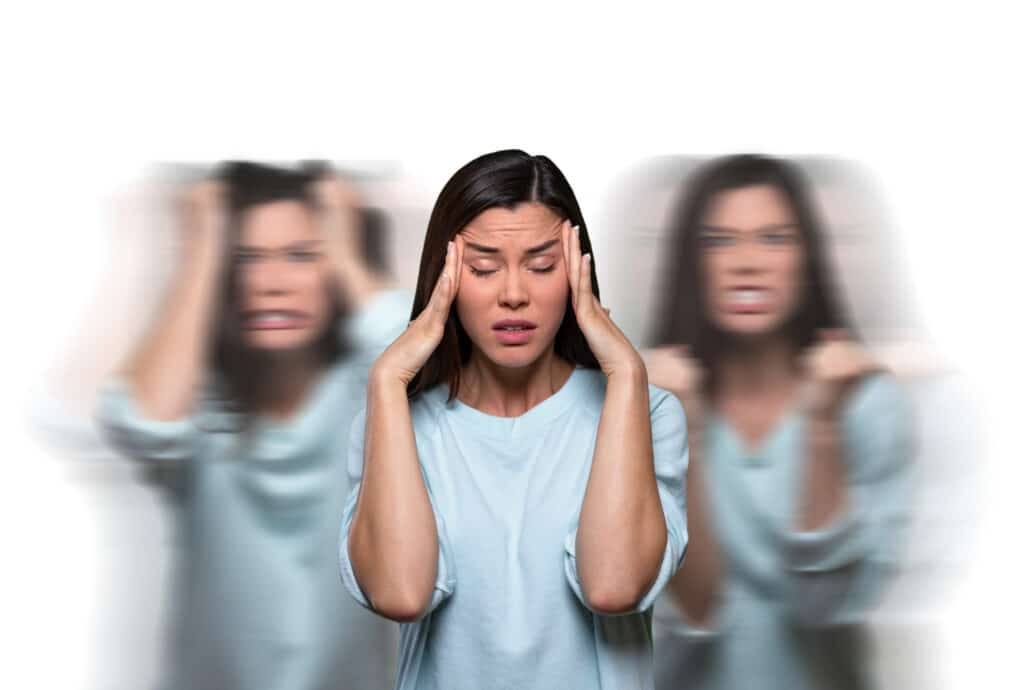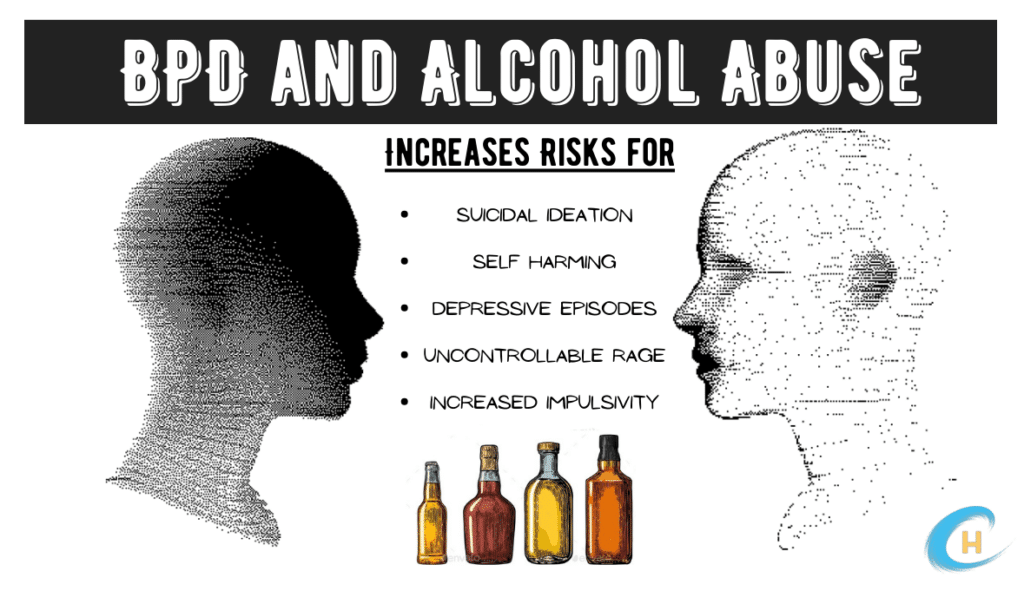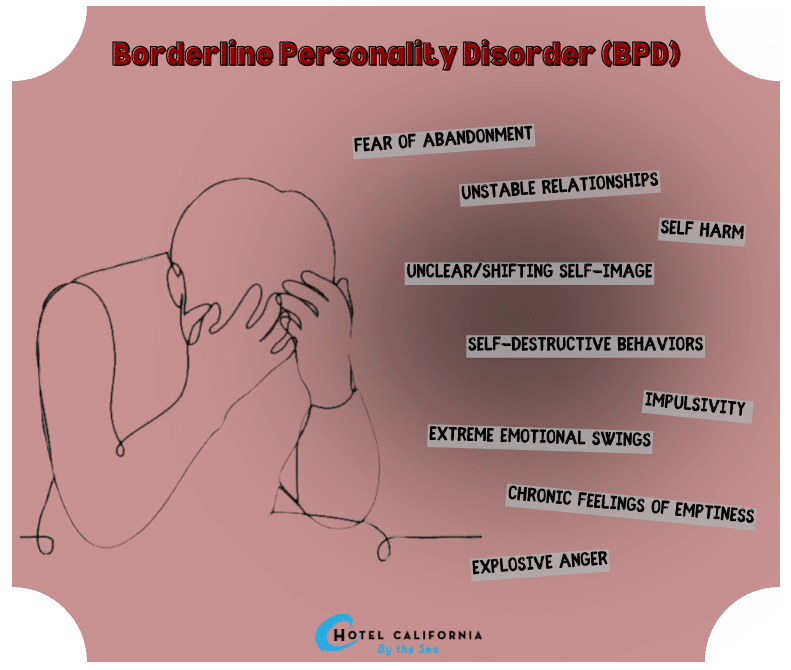Is there a correlation between BPD and Alcohol?
According to the DSM-5, borderline personality disorder (BPD) is characterized as a “pervasive, unstable pattern of interpersonal relationships and self-image, resulting in impulsivity.” This mental health disorder is present in about 1-1.6% of the general American population where people can experience intense mood swings, sudden changes in behaviors and changes in confidence. According to a 2022 National Survey on Drug Use and Health, an estimated 28 million Americans had alcohol use disorder (AUD). Together, BPD and alcohol abuse results in similar symptoms and are often present in a dual diagnosis.

Research has found there is a high comorbidity between borderline personality disorder and alcohol use disorder. Despite the high association between the two conditions, there are very few treatments available to treat symptoms of these co-occurring disorders.
What is Borderline Personality Disorder?
Borderline personality disorder is one of the least understood common mental health disorders. The exact cause is still unclear. The symptoms and severity of the condition vary greatly from person to person. It typically begins in adulthood and has also been clinically shown to be more common among females than males.
Borderline personality disorder can also be described as a person’s inner thoughts leading to a warped sense of reality. This leads to destructive behaviors, which can lead to difficulties and disruption in various aspects of their lives. People with BPD are often more intuitive with the emotions of others and can experience these feelings themselves. Because of this, it causes emotional intensity and even confusion as to why they are experiencing these feelings. The stress of the lack of understanding as to their absorption of new emotions can cause a sense of mental state deterioration.

Share this Image On Your Site
Nine distinguishing symptoms of Borderline Personality Disorder
- Fear of Abandonment. Borderline personality disorder can trigger intense fears of real or imagined abandonment; leading to efforts to keep loved ones close.
- Unstable Relationships. People with BPD often experience patterns of intense and unstable relationships.
- Unclear Self-Image. With BPD, a person’s sense of self is unclear, distorted and unstable.
- Impulsive Self Destructive Behaviors. Often BPD can lead to engaging in harmful and self-destructive behaviors when a person is upset.
- Self Harm. BPD can lead to reoccurring suicidal thoughts, threats and behaviors resulting in deliberate self-harm.
- Extreme Emotional Mood Swings. BPD symptoms include intense and highly changeable moods and emotions. People diagnosed with BPD often view things in extremes.
- Chronic Feelings of Emptiness. Persistent feelings of nothingness and feeling like a nobody.
- Explosive Anger. People with BPD can struggle with inappropriate intense anger. They are often short-tempered and are unable to control their enraged feelings.
- Out of Touch with Reality. People with BPD often develop feelings of suspicion, and stress-related paranoid thoughts and often disassociate with reality.

Factors that can contribute to developing BPD
- Genetics – Borderline personality disorder is five times more likely to occur if a person has a close family member who has also been diagnosed with the disorder.
- Brain Chemistry – Studies and research show people with borderline personality disorder have structural and functional changes in the brain, specifically in areas that control impulse and emotional regulation.
- Environment – People in and exposed to stressful and highly toxic social environments tend to develop symptoms of borderline personality disorder. This can include living in a disruptive environment with unstable family support.
- Childhood trauma – People who experience childhood trauma and stress are much more likely to develop mental health conditions.
Check Your Insurance Coverage for FREE
Find out if your insurance covers addiction treatment in minutes. We accept most insurance!
BPD and Alcohol
BPD and alcohol are highly comorbid mental health disorders. In some cases, BPD can trigger an alcohol use disorder. In other cases, alcohol abuse can trigger the development of BPD. Both disorders have overlapping symptoms, which can make it difficult to distinguish, diagnose and treat. This can be a problem when trying to recognize which disorder a person actually has. Studies found about 47% of people with BPD also experience alcohol dependence. What is the reasoning for this?
In many people with mental health disorders, especially borderline personality disorder, alcohol becomes a form of self-medication. It is used to dull stimulating senses and temporarily escape from the stresses of reality. In those with BPD who engage in drinking, there is a higher risk of developing an addiction more quickly and severely.
One of the common traits of a person with BPD is an addictive personality. This trait can apply to anything that can provide stimulation. When alcohol is introduced, dependence and addiction to alcohol can develop because the symptoms provide stimulation to help subside other uncomfortable symptoms of BPD. This also means the person will be unable to regulate or moderate their drinking habits. And eventually lead to the development of alcohol tolerance, dependence and addiction.
The combination of both BPD and alcohol abuse and addiction can magnify the uncomfortable side effects of both mental health conditions. Because the symptoms are often overlapping, all side effects become intensified and can lead to dangerous outcomes. In a person suffering from an alcoholic blackout, they can experience feelings of shame, remorse, irritability and fear. These are also all symptoms of BPD.
Ways to Cope with Borderline Personality Disorder
- Practice mindfulness. This can help calm feelings of emotional chaos that often erupt in people who experience BPD.
- Participate in an activity that stimulates your senses. Picking up a new hobby to exercise your mind can help you focus on something other than your emotions.
- Learn to reduce emotional vulnerability and control impulsivity. Learning to tolerate distress and emotional waves of feelings can help you learn to control your reactions to these feelings. You can practice grounding exercises to help and distract yourself.
- Improving interpersonal skills. By checking on your assumptions and reducing negativity, you can learn to stop projecting emotions on others and take responsibility for your role in your feelings.
Reach out to Hotel California by the Sea
We specialize in treating addiction and other co-occurring disorders, such as PTSD. Our Admissions specialists are available to walk you through the best options for treating your addiction.
Treatment for BDP and Alcohol Use Disorder
People who are diagnosed with BPD and alcohol use disorder often face worse outcomes compared to those who have either BPD or alcohol use disorder. This is due to the lack of treatment for the dual diagnosis. There are many treatment options for borderline personality disorder. There are many treatment options for alcohol use disorder. However, when they occur together, treatment options are limited. For example, pharmacology and medication management are common forms of treatment for both BPD and alcohol abuse when they occur separately. There is not enough evidence or research to show proven treatments or techniques in treating a co-occurring disorder.
At Hotel California by the Sea, we specialize in the treatment of co-occurring mental health disorders. We believe all substance use disorders such as AUD often have psychological and emotional components contributing to distressing symptoms of the disease. Mental health disorders such as borderline personality disorder can often develop or be the cause of substance use disorder. Either way, treating both conditions simultaneously is important in a client’s recovery journey.
We provide detox, residential and outpatient programs. We also provide specialized cognitive therapy treatments such as DBT. Dialectic Behavioral Therapy is a unique therapy created to help treat symptoms of borderline personality disorder. Implementing this type of therapy into individualized treatment programs for clients diagnosed with a co-occurring mental health disorder can greatly improve the outcome of sobriety. Our goal is to help our clients overcome their addiction through the necessary tools, resources and support from Hotel California by the Sea.
References:
https://www.niaaa.nih.gov/publications/brochures-and-fact-sheets/understanding-alcohol-use-disorder
https://www.helpguide.org/articles/mental-disorders/borderline-personality-disorder.htm
https://vertavahealth.com/blog/borderline-personality-disorder-alcohol-blackouts/
https://www.hopkinsmedicine.org/health/conditions-and-diseases/borderline-personality-disorder
https://recovered.org/mental-health/borderline-personality-disorder
https://www.addictioncenter.com/addiction/borderline-personality-disorder/
https://www.ncbi.nlm.nih.gov/pmc/articles/PMC6927749/
https://www.ncbi.nlm.nih.gov/pmc/articles/PMC3697118/
https://www.alcoholrehabguide.org/resources/dual-diagnosis/alcohol-and-borderline-personality-disorder/
